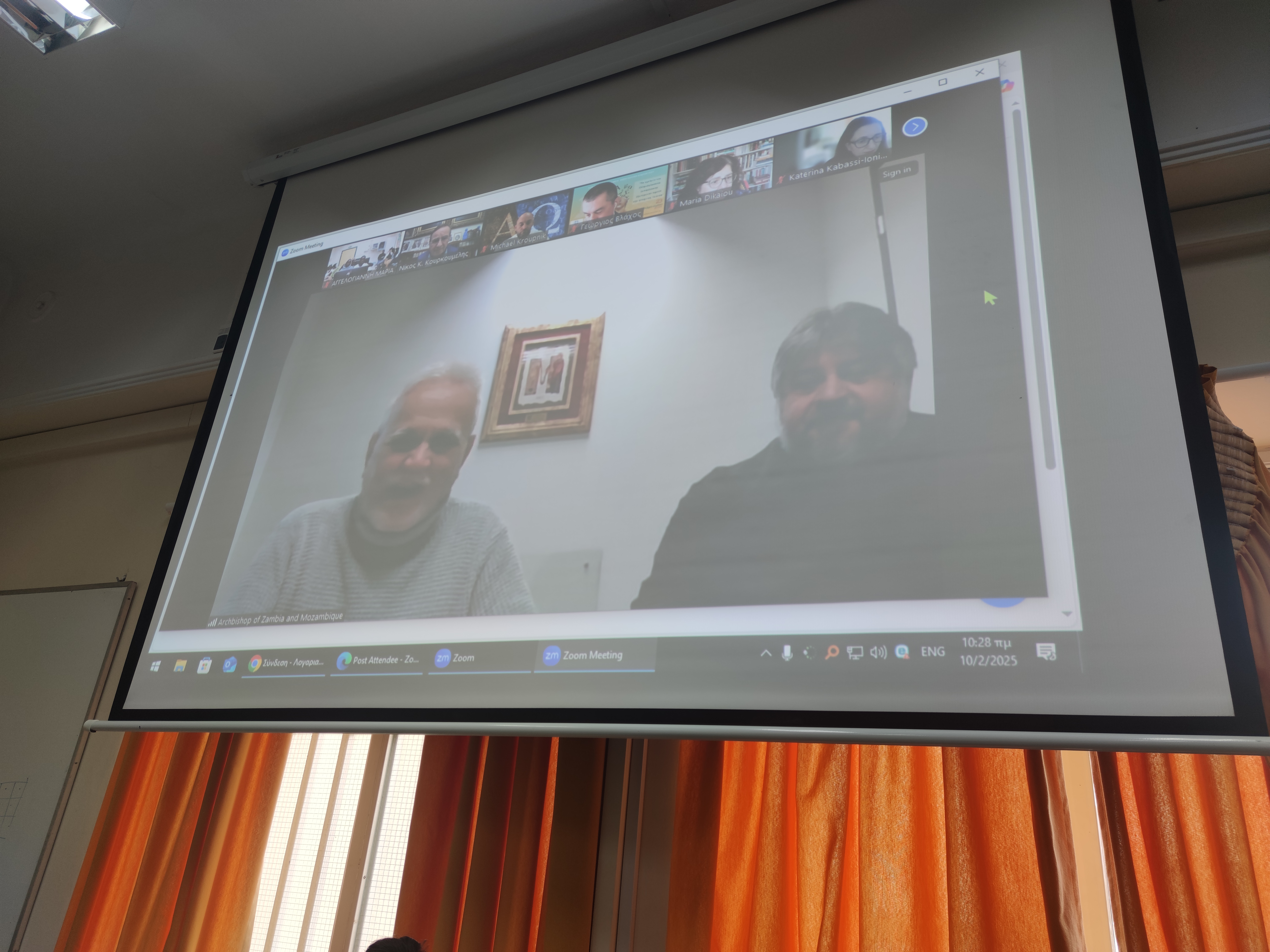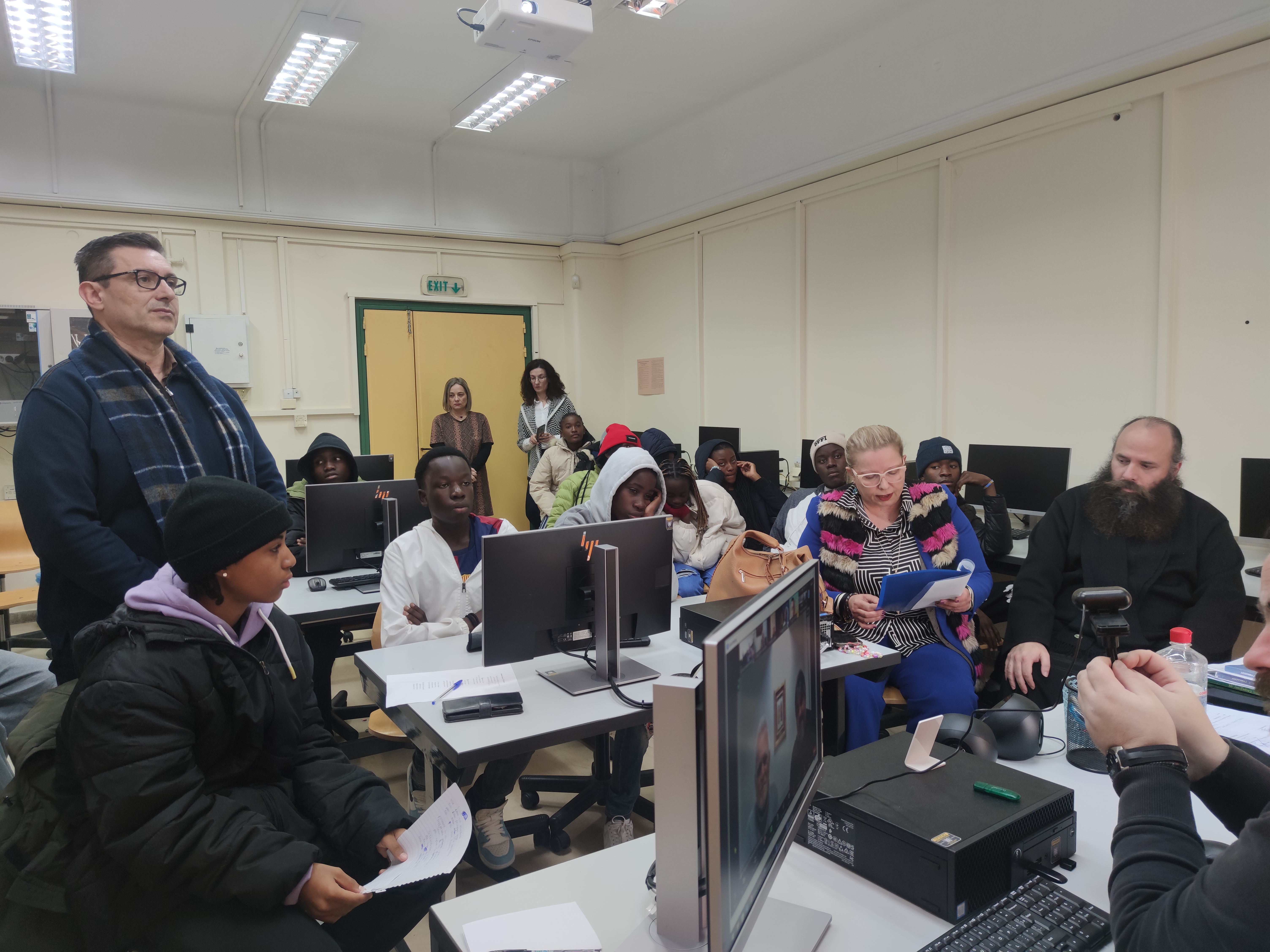«Ομιλείτε ελληνικά;»
Παγκόσμια ημέρα της Ελληνικής Γλώσσας, η 9η Φεβρουαρίου και η επιλογή της συγκεκριμένης ημερομηνίας μόνο τυχαία δεν είναι, καθώς την ημέρα αυτή, εν έτει 1857, έφυγε από τη ζωή ο εθνικός μας ποιητής, Διονύσιος Σολωμός.
Στο πλαίσιο αυτό για 6η συνεχή χρονιά, η Ιερά Μητρόπολη Ζάμπιας και Μοζαμβίκης σε συνεργασία με το Επίτιμο Γενικό Προξενείο της Ελλάδος στη Λουσάκα και το Συντονιστικό Γραφείο Εκπαίδευσης του Γενικού Προξενείου της Ελλάδος στο Γιοχάνεσμπουργκ, διοργάνωσε αφιερωματική συνάντηση Παγκόσμιας Ημέρας Ελληνικής Γλώσσας, η οποία πραγματοποιήθηκε διαδικτυακώς την Δευτέρα, 10 Φεβρουαρίου 2025, με θέμα «Ωδή στην Ελληνική Γλώσσα».
Στην εν λόγω συνάντηση, συμμετείχαν ο Διευθυντής Δευτεροβάθμιας Εκπαίδευσης Φθιώτιδας, κ. Κωνσταντίνος Σπαλιώρας, η Σύμβουλος Εκπαιδεύσεως Θεολόγων Ν. Φθιώτιδος και Συντονίστρια Εκπαιδευτικού Έργου του Σχολείου μας, κ. Αφροδίτη Σπαλιώρα, ο Διευθυντής του Σχολείου και φυσικά τα νέα μέλη της σχολικής μας κοινότητας, οι μαθητές και οι μαθήτριες από την Αφρική μαζί με τις εκπαιδευτικούς τους που διδάσκουν την ελληνική γλώσσα.
Στόχος των συναντήσεων αυτών είναι η ανάδειξη της μοναδικότητας αλλά και της διαχρονικότητας της ελληνικής γλώσσας, μιας γλώσσας που μιλιέται εδώ και αιώνες, μιας γλώσσας μέσα από την οποία γνωρίσαμε τον Πλάτωνα και τον Αριστοτέλη, τον Θουκυδίδη και τον Αισχύλο αλλά και πλήθος άλλων σπουδαίων φιλοσόφων, ποιητών και επιστημόνων.
«Είθε η ελληνική γλώσσα να γίνει κοινή όλων των λαών», είχε πει κάποτε ο Βολταίρος, θέλοντας με αυτόν τον τρόπο να δείξει τον βαθύτατο σεβασμό του απέναντι στη Γλώσσα την Ελληνική.
Παρακάτω παρατίθεται η ιστορική ομιλία του Ξενοφώντα Ζολώτα στα αγγλικά, σχεδόν εξ΄ ολοκλήρου με λέξεις ελληνικής προέλευσης, που εκφωνήθηκε στις 2 Οκτωβρίου 1959.
Kyrie,
It is Zeus’ anathema on our epoch and the heresy of our economic method and policies that we should agonize the Skylla of nomismatic plethora and the Charybdis of economic anaemia.
It is not my idiosyncracy to be ironic or sarcastic but my diagnosis would be that politicians are rather cryptoplethorists. Although they emphatically stigmatize nomismatic plethora, they energize it through their tactics and practices. Our policies should be based more on economic and less on political criteria. Our gnomon has to be a metron between economic strategic and philanthropic scopes.
In an epoch characterized by monopolies, oligopolies, monopolistic antagonism and polymorphous inelasticities, our policies have to be more orthological, but this should not be metamorphosed into plethorophobia, which is endemic among academic economists.
Nomismatic symmetry should not antagonize economic acme. A greater harmonization between the practices of the economic and nomismatic archons is basic.
Parallel to this we have to synchronize and harmonize more and more our economic and nomismatic policies panethnically. These scopes are more practicable now, when the prognostics of the political end economic barometer are halcyonic.
The history of our didimus organization on this sphere has been didactic and their gnostic practices will always be a tonic to the polyonymous and idiomorphous ethnical economies. The genesis of the programmed organization will dynamize these policies.
Therefore, I sympathize, although not without criticism one or two themes with the apostles and the hierarchy of our organs in their zeal to program orthodox economic and nomismatic policies.
I apologize for having tyranized you with my Hellenic phraseology. In my epilogue I emphasize my eulogy to the philoxenous aytochtons of this cosmopolitan metropolis and my encomium to you Kyrie, the stenographers.




